junk food persuasive
垃圾食品有危害的作文英语
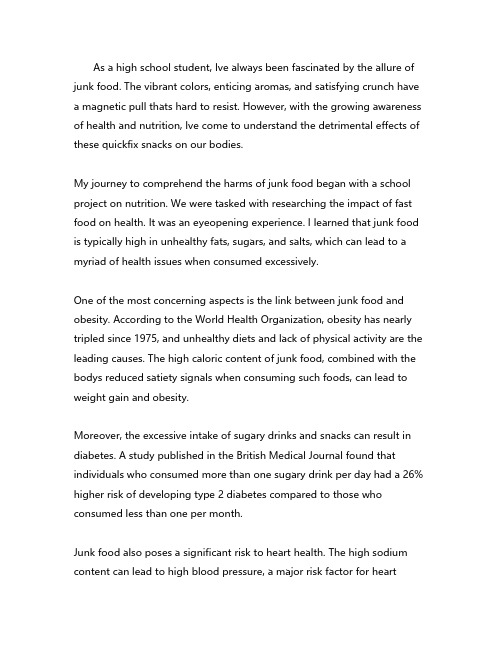
As a high school student, Ive always been fascinated by the allure of junk food. The vibrant colors, enticing aromas, and satisfying crunch have a magnetic pull thats hard to resist. However, with the growing awareness of health and nutrition, Ive come to understand the detrimental effects of these quickfix snacks on our bodies.My journey to comprehend the harms of junk food began with a school project on nutrition. We were tasked with researching the impact of fast food on health. It was an eyeopening experience. I learned that junk food is typically high in unhealthy fats, sugars, and salts, which can lead to a myriad of health issues when consumed excessively.One of the most concerning aspects is the link between junk food and obesity. According to the World Health Organization, obesity has nearly tripled since 1975, and unhealthy diets and lack of physical activity are the leading causes. The high caloric content of junk food, combined with the bodys reduced satiety signals when consuming such foods, can lead to weight gain and obesity.Moreover, the excessive intake of sugary drinks and snacks can result in diabetes. A study published in the British Medical Journal found that individuals who consumed more than one sugary drink per day had a 26% higher risk of developing type 2 diabetes compared to those who consumed less than one per month.Junk food also poses a significant risk to heart health. The high sodium content can lead to high blood pressure, a major risk factor for heartdisease and stroke. Additionally, the trans fats found in many processed foods can raise bad cholesterol levels and lower good cholesterol, further increasing the risk of cardiovascular problems.My personal experience with junk food was a wakeup call. I used to indulge in fast food burgers, fries, and sugary sodas regularly. However, after noticing a gradual decline in my energy levels and an increase in my waistline, I decided to make a change. I started incorporating more fruits, vegetables, and whole grains into my diet, and the results were remarkable.I felt more energetic, my skin cleared up, and I even noticed an improvement in my mood and concentration.But the battle against junk food isnt just an individual one its a societal issue. Advertising plays a significant role in promoting junk food. The slick commercials and persuasive marketing tactics target not only adults but also children, shaping their food preferences from a young age. Its crucial for parents, educators, and policymakers to work together to promote healthier eating habits and counteract the influence of junk food advertising.In conclusion, while junk food may offer a temporary satisfaction, the longterm effects on our health are farreaching and detrimental. Its essential to educate ourselves and future generations about the importance of a balanced diet and the risks associated with consuming junk food. By making informed choices and advocating for healthier food options, we can pave the way for a healthier society.。
关于junk food的英语作文
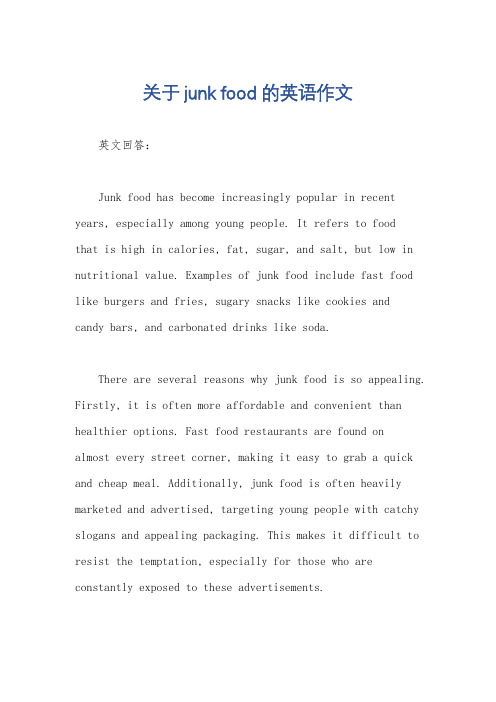
关于junk food的英语作文英文回答:Junk food has become increasingly popular in recent years, especially among young people. It refers to foodthat is high in calories, fat, sugar, and salt, but low in nutritional value. Examples of junk food include fast food like burgers and fries, sugary snacks like cookies andcandy bars, and carbonated drinks like soda.There are several reasons why junk food is so appealing. Firstly, it is often more affordable and convenient than healthier options. Fast food restaurants are found onalmost every street corner, making it easy to grab a quick and cheap meal. Additionally, junk food is often heavily marketed and advertised, targeting young people with catchy slogans and appealing packaging. This makes it difficult to resist the temptation, especially for those who are constantly exposed to these advertisements.Another reason for the popularity of junk food is its addictive nature. Many junk foods are engineered to be highly palatable, using a combination of sugar, salt, and fat to create a pleasurable taste sensation. This can lead to overconsumption and even addiction, as the brain becomes accustomed to the rewarding effects of these foods. As a result, people may find it difficult to control their intake and develop unhealthy eating habits.Furthermore, junk food is often associated with social activities and gatherings. It is common to see people indulging in pizza, chips, and soda while watching a movie or hanging out with friends. The social aspect of junk food can make it difficult to resist, as it is often seen as a form of bonding and enjoyment. This can lead to a cycle of unhealthy eating habits, as people associate junk food with positive experiences and emotions.Despite its popularity, junk food has numerous negative effects on our health. Regular consumption of junk food can lead to weight gain, obesity, and a higher risk of developing chronic diseases such as diabetes and heartdisease. It can also negatively impact our mental health,as a poor diet has been linked to depression and anxiety.中文回答:垃圾食品近年来变得越来越受欢迎,尤其是在年轻人中间。
写给编辑的英语作文关于垃圾食品的
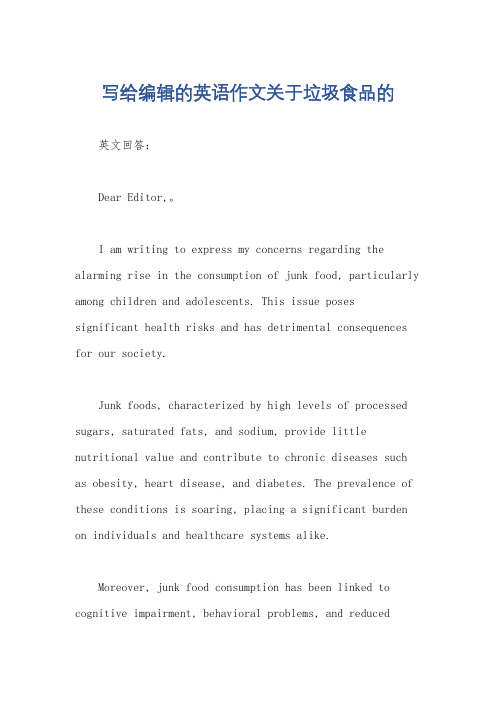
写给编辑的英语作文关于垃圾食品的英文回答:Dear Editor,。
I am writing to express my concerns regarding the alarming rise in the consumption of junk food, particularly among children and adolescents. This issue posessignificant health risks and has detrimental consequences for our society.Junk foods, characterized by high levels of processed sugars, saturated fats, and sodium, provide little nutritional value and contribute to chronic diseases such as obesity, heart disease, and diabetes. The prevalence of these conditions is soaring, placing a significant burden on individuals and healthcare systems alike.Moreover, junk food consumption has been linked to cognitive impairment, behavioral problems, and reducedacademic performance. Studies have shown that children who consume excessive amounts of sugary drinks, for example, exhibit deficits in attention, memory, and problem-solving abilities.The marketing of junk food is particularly concerning, as it often targets children through eye-catching packaging and persuasive advertising. This aggressive marketing exploits children's vulnerability and contributes to the establishment of unhealthy eating habits at a young age.To address this critical issue, a comprehensive approach is required. Governments should implement regulations to restrict the marketing of junk food to children and increase taxes on sugary drinks and unhealthy snacks. Schools and communities should promote healthy eating and physical activity, and parents should play an active role in ensuring their children's nutritional well-being.Furthermore, food manufacturers have a responsibility to reformulate their products to reduce unhealthyingredients. They can provide healthier alternatives that are still appealing to consumers. By working together, we can create an environment that supports healthy eating and reduces the risks associated with junk food consumption.Thank you for your attention to this urgent matter. I urge you to consider these concerns and advocate for policies that prioritize the health and well-being of our future generations.Sincerely,。
垃圾食品英文作文100字

垃圾食品英文作文100字英文回答:Junk food is a term used to describe food that is high in calories, sugar, and unhealthy fats. It is often processed and contains artificial ingredients and preservatives. Junk food is typically low in nutritional value and can be harmful to your health if eaten regularly.Some examples of junk food include:CandyChipsSodaFast foodProcessed snacksEating junk food can lead to weight gain, heart disease, diabetes, and other health problems. It can also make you feel tired and sluggish.If you are trying to lose weight or improve your health, it is important to limit your intake of junk food. Instead, opt for healthy snacks such as fruits, vegetables, and whole grains.中文回答:垃圾食品是指热量、糖分和不健康脂肪含量高的食物。
它通常经过加工,并含有人工成分和防腐剂。
垃圾食品的营养价值通常很低,如果经常食用,对健康有害。
垃圾食品的一些例子包括:糖果薯片汽水快餐加工零食经常食用垃圾食品会导致体重增加、心脏病、糖尿病和其他健康问题。
垃圾食品广告是否应该被禁止英语作文
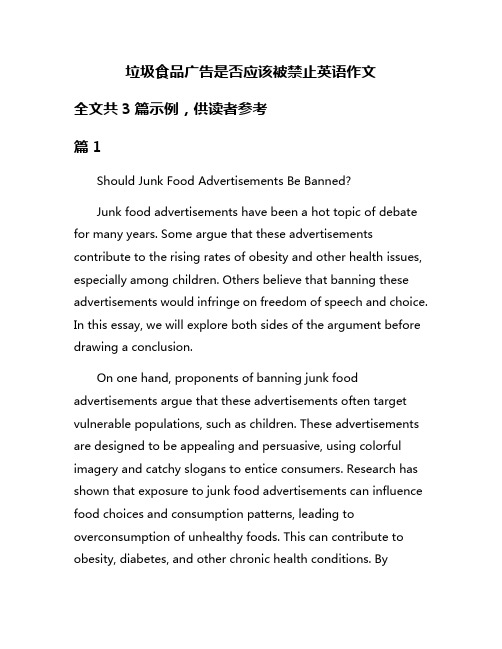
垃圾食品广告是否应该被禁止英语作文全文共3篇示例,供读者参考篇1Should Junk Food Advertisements Be Banned?Junk food advertisements have been a hot topic of debate for many years. Some argue that these advertisements contribute to the rising rates of obesity and other health issues, especially among children. Others believe that banning these advertisements would infringe on freedom of speech and choice. In this essay, we will explore both sides of the argument before drawing a conclusion.On one hand, proponents of banning junk food advertisements argue that these advertisements often target vulnerable populations, such as children. These advertisements are designed to be appealing and persuasive, using colorful imagery and catchy slogans to entice consumers. Research has shown that exposure to junk food advertisements can influence food choices and consumption patterns, leading to overconsumption of unhealthy foods. This can contribute to obesity, diabetes, and other chronic health conditions. Bybanning junk food advertisements, advocates believe that we can protect consumers, especially children, from the harmful effects of these products.On the other hand, opponents of banning junk food advertisements argue that such a ban would violate freedom of speech and choice. They believe that individuals have the right to make their own decisions about what to eat and drink, without government interference. Additionally, critics argue that banning junk food advertisements would not address the root causes of obesity and other health issues, such as lack of access to healthy foods, sedentary lifestyles, and socioeconomic factors. Instead of banning advertisements, they suggest addressing these underlying issues through education, public health campaigns, and policy changes.Ultimately, the debate over whether junk food advertisements should be banned is complex and multifaceted. While there is evidence to suggest that these advertisements can contribute to health issues, there are also valid concerns about freedom of speech and choice. In my opinion, a balanced approach is needed. Instead of an outright ban on junk food advertisements, we should focus on regulating these advertisements to ensure they are truthful and not misleading.Additionally, we should invest in education and public health campaigns to promote healthy eating habits and lifestyles. By taking a comprehensive approach, we can address the root causes of obesity and other health issues while respecting individuals' rights to make their own choices.篇2Should Junk Food Advertisements be Banned?In recent years, there has been growing debate over whether junk food advertisements should be banned. On one hand, some argue that these advertisements contribute to the rise in obesity and other health problems among the population. On the other hand, critics argue that banning these advertisements would infringe on freedom of speech and the rights of companies to advertise their products. In this essay, we will explore both sides of the argument and discuss whether junk food advertisements should be banned.Those who argue in favor of banning junk food advertisements point to the harmful effects of these products on public health. Junk food is often high in sugar, salt, and fat, which can lead to obesity, diabetes, and other chronic diseases. By bombarding consumers with advertisements for these unhealthyproducts, companies are encouraging them to make poor dietary choices. This is particularly concerning for children, who are more susceptible to advertising and may develop lifelong habits of consuming junk food.Furthermore, research has shown that there is a link between exposure to junk food advertisements and higher consumption of unhealthy foods. A study published in the American Journal of Clinical Nutrition found that children who watched more television ads for junk food were more likely to consume unhealthy snacks. This suggests that advertising does have an impact on consumer behavior and can contribute to the obesity epidemic.Advocates for banning junk food advertisements also argue that it is the responsibility of the government to protect public health. Just as the government regulates tobacco advertisements to reduce smoking rates, it should also regulate junk food advertisements to combat obesity. By banning these advertisements, the government can help to create a healthier environment and encourage people to make better food choices.On the other hand, critics of banning junk food advertisements argue that it is a violation of free speech rights.Companies should have the right to advertise their products and compete in the marketplace. Banning these advertisements would limit the ability of companies to reach their target audience and promote their products. This could have a negative impact on the economy and stifle innovation in the food industry.Furthermore, critics point out that there are already regulations in place to restrict junk food advertisements to children. For example, the Children's Food and Beverage Advertising Initiative (CFBAI) sets guidelines for companies to limit advertising of unhealthy foods to children under 12. By enforcing existing regulations, the government can address concerns about advertising without resorting to a complete ban.In conclusion, the debate over whether junk food advertisements should be banned is complex and multifaceted. While there are valid arguments on both sides, the evidence suggests that these advertisements do contribute to the rise in obesity and other health problems. Therefore, it may be necessary for the government to consider implementing restrictions on junk food advertisements to protect public health. By striking a balance between freedom of speech and public health, we can create a healthier environment for all.篇3Should Junk Food Advertising Be Banned?IntroductionIn recent years, there has been an increasing concern about the impact of junk food advertising on people's diets and overall health. Many health experts argue that junk food advertising should be banned in order to combat the obesity epidemic and promote healthier eating habits. On the other hand, some argue that banning junk food advertising would infringe on freedom of speech and undermine the principles of a free market economy. In this essay, we will explore both sides of the debate and consider whether junk food advertising should be banned.Arguments in Favor of Banning Junk Food AdvertisingOne of the main arguments in favor of banning junk food advertising is that it contributes to the rising rates of obesity and related health issues. Studies have shown that exposure to junk food advertising influences people's food choices and leads to increased consumption of unhealthy foods. By banning junk food advertising, we can reduce the prevalence of unhealthy foods in the market and promote healthier eating habits.Furthermore, junk food advertising often targets children and teenagers, who are more vulnerable to marketing strategies. Children are exposed to an overwhelming amount of junk food advertising on television, the internet, and social media, which can lead to the development of unhealthy eating habits from a young age. By banning junk food advertising, we can protect children from the harmful effects of marketing unhealthy foods.Additionally, banning junk food advertising would send a strong message to food companies that they have a social responsibility to promote healthier products. By limiting the marketing of unhealthy foods, we can encourage food companies to invest in the development and promotion of healthier alternatives. This could lead to a shift in consumer preferences towards healthier options and ultimately improve public health.Arguments Against Banning Junk Food AdvertisingDespite the potential benefits of banning junk food advertising, there are also arguments against it. One of the main arguments is that banning junk food advertising would infringe on freedom of speech and limit the ability of companies to promote their products. In a free market economy, businesses have the right to advertise their products to consumers, andbanning junk food advertising would restrict this fundamental right.Furthermore, some argue that banning junk food advertising would not address the root causes of obesity and unhealthy eating habits. Simply restricting the marketing of unhealthy foods may not be enough to change people's behavior and promote healthier lifestyles. Instead of focusing on advertising regulations, efforts should be directed towards increasing education and awareness about nutrition and healthy eating.Additionally, banning junk food advertising could have unintended consequences, such as driving the marketing of unhealthy foods underground or promoting unregulated forms of advertising. Rather than banning junk food advertising outright, some argue that a more balanced approach, such as implementing stricter regulations on marketing to children or promoting healthier food options, would be more effective in addressing the issue.ConclusionIn conclusion, the debate over whether junk food advertising should be banned is complex and multifaceted. While there are valid arguments in favor of banning junk food advertising as a way to combat obesity and promote healthier eating habits,there are also concerns about infringing on freedom of speech and the limitations of advertising restrictions. Ultimately, a balanced approach that considers both the public health implications and the principles of a free market economy may be the most effective way to address the issue of junk food advertising. Whether or not junk food advertising should be banned will continue to be a topic of debate as we strive to promote healthier lifestyles and combat the obesity epidemic.。
垃圾食品英语作文
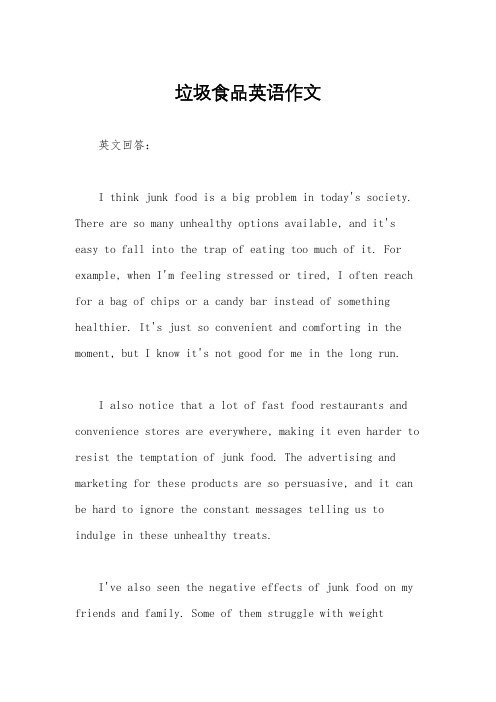
垃圾食品英语作文英文回答:I think junk food is a big problem in today's society. There are so many unhealthy options available, and it's easy to fall into the trap of eating too much of it. For example, when I'm feeling stressed or tired, I often reach for a bag of chips or a candy bar instead of something healthier. It's just so convenient and comforting in the moment, but I know it's not good for me in the long run.I also notice that a lot of fast food restaurants and convenience stores are everywhere, making it even harder to resist the temptation of junk food. The advertising and marketing for these products are so persuasive, and it can be hard to ignore the constant messages telling us to indulge in these unhealthy treats.I've also seen the negative effects of junk food on my friends and family. Some of them struggle with weightissues, while others have health problems like high cholesterol and diabetes. It's scary to see how much of an impact these foods can have on our bodies and overall well-being.中文回答:我觉得垃圾食品在当今社会是一个很大的问题。
垃圾食品的英语作文800
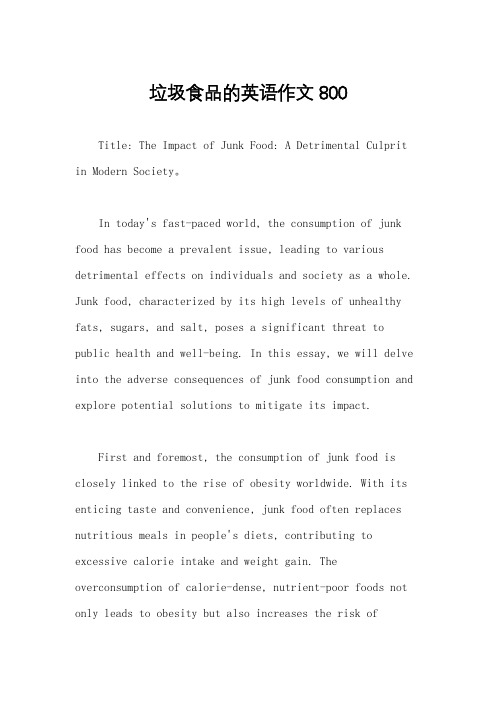
垃圾食品的英语作文800Title: The Impact of Junk Food: A Detrimental Culprit in Modern Society。
In today's fast-paced world, the consumption of junk food has become a prevalent issue, leading to various detrimental effects on individuals and society as a whole. Junk food, characterized by its high levels of unhealthy fats, sugars, and salt, poses a significant threat to public health and well-being. In this essay, we will delve into the adverse consequences of junk food consumption and explore potential solutions to mitigate its impact.First and foremost, the consumption of junk food is closely linked to the rise of obesity worldwide. With its enticing taste and convenience, junk food often replaces nutritious meals in people's diets, contributing to excessive calorie intake and weight gain. The overconsumption of calorie-dense, nutrient-poor foods not only leads to obesity but also increases the risk ofdeveloping chronic conditions such as type 2 diabetes, cardiovascular diseases, and certain types of cancer.Moreover, the prevalence of junk food in modern society has profound implications for public health systems and healthcare costs. The burden of treating obesity-related illnesses places strain on healthcare resources and budgets, diverting attention and funds away from other pressinghealth issues. As a result, addressing the root causes of junk food consumption is imperative for promoting long-term public health and sustainability.Furthermore, the marketing tactics employed by the junk food industry contribute to its widespread consumption, particularly among vulnerable populations such as children and adolescents. Advertisements targeting these demographics often use persuasive techniques to promote unhealthy food choices, creating a culture ofoverindulgence and poor dietary habits from a young age. This perpetuates a cycle of dependency on junk food and reinforces societal norms that prioritize convenience over health.In addition to its impact on physical health, junk food consumption also takes a toll on mental well-being. Research has shown that diets high in processed foods are associated with an increased risk of depression and anxiety. The fluctuations in blood sugar levels caused by consuming sugary snacks and beverages can affect mood stability and exacerbate feelings of stress and fatigue. Thus, addressing the root causes of junk food consumption is essential for promoting not only physical but also mental health and resilience.To combat the adverse effects of junk food, a multifaceted approach is needed. Education and awareness campaigns can play a crucial role in informing the public about the health risks associated with excessive junk food consumption and empowering individuals to make healthier choices. Additionally, policymakers can implementregulations to restrict the marketing and availability of junk food, particularly in settings frequented by children and adolescents, such as schools and recreationalfacilities. 。
高一英语下册单词表
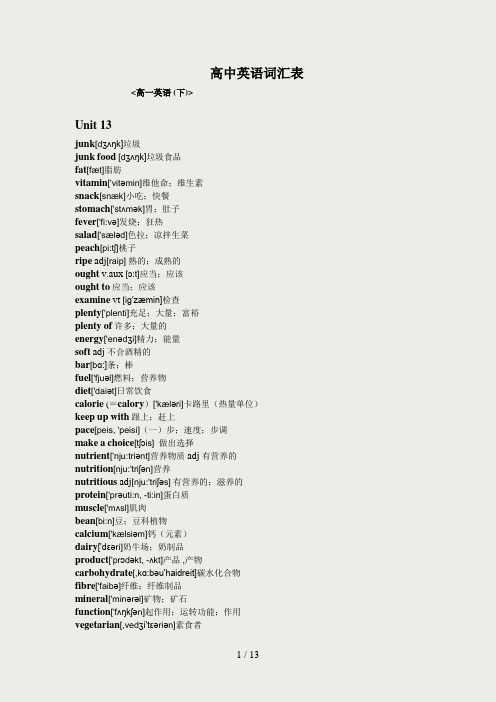
高中英语词汇表<高一英语 (下)>Unit 13junk[dʒʌŋk]垃圾junk food[dʒʌŋk]垃圾食品fat[fæt]脂肪vitamin['vitəmin]维他命;维生素snack[snæk]小吃;快餐stomach['stʌmək]胃;肚子fever['fi:və]发烧;狂热salad['sæləd]色拉;凉拌生菜peach[pi:tʃ]桃子ripe adj[raip]熟的;成熟的ought v.aux[ɔ:t]应当;应该ought to应当;应该examine vt[iɡ'zæmin]检查plenty['plenti]充足;大量;富裕plenty of许多;大量的energy['enədʒi]精力;能量soft adj不合酒精的bar[bɑ:]条;棒fuel['fjuəl]燃料;营养物diet['daiət]日常饮食calorie (=calory)['kæləri]卡路里(热量单位)keep up with跟上;赶上pace[peis, 'peisi](一)步;速度;步调make a choice[tʃɔis] 做出选择nutrient['nju:triənt]营养物质adj有营养的nutrition[nju:'triʃən]营养nutritious adj[nju:'triʃəs]有营养的;滋养的protein['prəuti:n, -ti:in]蛋白质muscle['mʌsl]肌肉bean[bi:n]豆;豆科植物calcium['kælsiəm]钙(元素)dairy['dεəri]奶牛场;奶制品product['prɔdəkt, -ʌkt]产品 ,产物carbohydrate[,kɑ:bəu'haidreit]碳水化合物fibre['faibə]纤维;纤维制品mineral['minərəl]矿物;矿石function['fʌŋkʃən]起作用;运转功能;作用vegetarian[,vedʒi'tεəriən]素食者vegan['vedʒən]严格的素食主义者yoghur['jɔɡət, 'jəu-] t酸乳;酸奶eco-food['i:kəu, 'ekəu]生态食品organic adj[ɔ:'ɡænik]有机的chemical['kemikəl]化学制品;化学药品balance vt&vi&n平衡supplement['sʌplimənt补充fit adj['fit]健康的;适合的Unit['ju:nit]单位;单元digest vt[di'dʒest消化(食物);领会gain vt[ɡein]增加;获得sleepy adj['sli:pi] 瞌睡的;困乏的refuel vi[,ri:'fjuəl]补给燃料;补充能量now and then[ðen]时而;不时;偶尔brain[brein]脑;头脑peel vt[pi:l]剥;削;剥落果皮;蔬菜皮recipe['resipi]食谱;烹饪法roll-up['rəul'ʌp]卷;卷状食品roll up(使)成卷(或筒、球)形tasty adj['teisti]好吃的;可口的ingredient[in'ɡri:diənt]烹任原料;成分mushroom['mʌʃru:m, -rum]蘑菇chop vt[[tʃɔp]]剁碎;砍steam vt[sti:m]蒸vi蒸发boil vt&vt[bɔil]煮沸bacon['beikən]咸肉;熏肉lettuce['letis]生菜mixture['mikstʃə]混合;混合物spoonful['spu:nful]一匙的量slice vt&vi[slais] 将某物切成薄片, 片;薄片;切片dice vt&vi[dais]将某物切成小方块:切成丁小方块stir vt[stə:] 搅拌;搅动Unit 18theme[θi:m]主题dress up[dres] 盛装;打扮;装饰parade[pə'reid]游行;行进holy adj[['həuli]]神圣的;神的Easter['i:stə](耶稣)复活节symbol['simbəl]象征;符号;记号bunny['bʌni]兔子fighting['faitiŋ]战斗;打仗conflict[kən'flikt, 'kɔnflikt]斗争;战斗;冲突argument['ɑ:ɡjumənt]争论;辩论destruction[di'strʌkʃən] 破坏;毁灭opinion[ə'pinjən]意见;看法in one’s opinion[ə'pinjən]按照……的看法major adj['meidʒə] 重大的;主要的probably adv['prɔbəbli]大概;很可能Kwanzaa['kwa:nzə]宽扎节honour (=honor)['ɔnə] 尊敬:给以荣誉ancesto['ænsestə]r祖先;祖宗principle['prinsəpl]法则;原则;原理Unity['ju:niti]团结;联合;统一commUnity[kə'mju:niti] 团体;社会nation['neiʃən]国家;民族self-determination['selfdi'tə:mi'neiʃən]自主;自我决定purpose['pə:pəs]目的;意图creativity[,kriei'tiviti]创造性(力)faith[feiθ]信任;信念;忠实commercial adj[kə'mə:ʃəl] 商业的;贸易的joy[dʒɔi]欢乐;喜悦:乐趣light vt['lait]点燃;照亮similar adj['similə]相似的generation[,dʒenə'reiʃən]一代(人)play a tick on sb[tik] 开某人玩笑;欺骗案人salute vi[sə'lju:t, sɑ:'lu:te]行礼致敬;敬礼kiss吻cheek[tʃi:k] 面颊;脸蛋nod vt&n[nɔd]点头celebration[,seli'breiʃən]庆祝;庆典reminder[ri'maində]提醒的人(物);暗示respect vt[ri'spekt] 尊敬;尊重skeleton n['skelitən](动物的)骨架;骨骼gift[ɡift]礼物;天赋cycle['saikl]周期;循环vi骑自行车fool[fu:l]愚人;白痴vi愚弄;欺骗take in欺骗;摄取invitation[,invi'teiʃən]邀请;邀请信occasion[ə'keiʒən, əu-]场合;时机;机会Unit 15mystery['mistəri]谜;神秘的事物mysterious adj[mi'stiəriəs]神秘的footprint['futprint] 足迹;脚印ladder['lædə] 梯子scary adj['skεəri, 'skæ-]引起惊慌的;吓人的dormitory['dɔ:mitəri] 宿舍recognize vt['rekəɡnaiz] 识别;认出surely adv['ʃuəli,想必;确实;一定diamond['daiəmənd]钻石explain vt[ik'splein]解释;说明ball[bɔ:l]舞会jewellery(=jewelry)['dʒu:əlri]珠宝;首饰;珠宝类franc[fræŋk]法郎(法国、比利时和瑞士的货币单位)continue vt&vi[kən'tinju:] 继续call on访问;号召;邀请lovely adj['lʌvli]好看的;可爱的bring back[briŋ]拿回来,使恢复day and night日日夜夜地pay off还清(债务等);付清debt[det]债务;欠款precious adj['preʃəs]宝贵的;贵重的,珍爱的at most至多positive adj['pɔzətiv, -zi-]肯定的;积极的attend vt[ə'tend]出席;!参加;上(大学等)rehearse vt[ri'hə:s]预演;排演earn vt[ə:n] 赚得;挣得lecture['lektʃə]演讲;讲课silly adj['sili] 缺乏常识(或理智)的;傻的mosquito[mə'ski:təu]蚊子bat[bæt]蝙蝠;(网球、乒乓球等的)球拍author['ɔ:θə]作者;作家act out[ækt]把……表演出来;把……付诸行动besides adv[bi'saidz] 此外,prep[prep]除……之外alien['eiljən] 外星人adj外国的;相异的outline['autlain]轮廓;要点;概要plot[plɔt](小说的)情节;结构quality['kwɔləti]品质;质量;性质Unit 16pro[prəu]赞成con[kɔn]反对experiment[ik'speriment, ek's-]实验;试验glove[ɡlʌv]手套gas[ɡæs]气体liquid['likwid]液体;液态物advantage[əd'vɑ:ntidʒ, əd'væn-]有利条件;优点disadvantage[disəd'vɑ:ntidʒ]不利;不利条件application[,æpli'keiʃən]应用 ,实施, 用途maglev n&adj['mæɡlev]磁力悬浮列车(的》engine['endʒin]发动机nuclear adj['nju:kliə, 'nu:-]核子的;原子能的economy[i'kɔnəmi]经济;节约comfort['kʌmfət]舒适;安慰unnecessary adj[,ʌn'nesəsəri]不必要的;多余的successful adj[sək'sesful]成功的;胜利的conduct vt['kɔndʌkt, kən'dʌkt]实施, 管理;指挥;引导行为;操行a number of['nʌmbə]若干;一些lightning['laitniŋ]闪电thunderstorm['θʌndəstɔ:m]雷雨;雷暴condenser [kən'densə]电容器;冷凝器shed [ʃed]小屋;牲口棚string[striŋ]线;细绳charge vt[tʃɑ:dʒ]使充电;要(价〉;控告;攻击electric adj[i'lektrik]电的;导电的;电动的shock[ʃɔk]电击;打击;震动a great deal of很多的;大量的prove vt[pru:v]证明;证实tear vt&vi [tiə]撕扯;撕裂;撕毁frame[freim]结构;框架handkerchief['hæŋkətʃif, -tʃi:f]手帕control vt&n[kən'trəul] 控制;支配;管理sharp adj[ʃɑ:p]锐利的;轮廓清晰的;灵敏的foot[fut]英尺fasten vt['fɑ:sən, 'fæ-]扎牢;拴紧;使固定ribbon['ribən]缎带;丝带;带状物thundercloud['θʌndəkləud]雷雨云pick out挑出;辨别出sense[sens]感觉,感官test vt&n[test]测试;试验;检验test on在……(身上)做试验shampoo[ʃæm'pu:]洗发精;洗发香波skin[skin]皮肤;(植物、果实等的)外壳drug药;麻药;麻醉药activist['æktivist]激进主义分子;行动主义分子doubt n&vt[daut]怀疑;疑惑cruel adj['kru:əl]残酷的;令人痛苦的painkiller['pein,kilə]止痛药;解痛物view[vju:]观点;风景conclusion[kən'klu:ʒən]结束;结论Unit 17inspire vt[in'spaiə]鼓舞;感动;激发;启示admire vt[əd'maiə]钦佩;赞赏generous adj['dʒenərəs]慷慨的;大方的cheerful adj['tʃiəful] 愉快的高兴的mean adj[mi:n]卑鄙的;吝啬的tense adj[tens]紧张的;拉紧的dull adj[dʌl]迟钝的;无趣的;呆滞的dishonest adj[dis'ɔnist]不诚实的champion['tʃæmpiən]冠军;得胜者;斗士the South Pole[sauθ, sauð] [pəul] 南极the North Pole[nɔ:θ]北极polar adj['pəulə]两极的;极地的Antarctica[ænt'ɑ:ktikə]南极洲mile[mail]英里sled[sled]雪橇around the corner[ə'raund] ['kɔ:nə]即将来临;在拐角处stormy adj['stɔ:mi]暴风雨的;多风暴的;激烈的threaten vt['θretən] 恐吓;威胁;预示(危险)die down[dai]变弱;平息;消失thaw vt[θɔ:]解冻slope[sləup]斜坡;斜面;倾斜bottom['bɔtəm]底部;尽头optimistic adj[,ɔpti'mistik]乐观的expedition[,ekspi'diʃən]远征;探险队workday['wə:kdei]一天的工作时间;工作日woozy adj['wu:zi, 'wu-] 眩晕的;虚弱的somehow adv['sʌmhau]某种方式;莫明其妙不知怎么地shelter['ʃeltə]掩蔽;掩蔽处;避身处regret[ri'ɡret]遗憾悔恨抱歉歉意vt为…感到遗憾;后悔solo adj['səuləu]单独的extreme adj[ik'stri:m] 极端的;极度的;偏激的extremely adv[ik'stri:mli] 非常地;极其地climate['klaimit]气候value vt['vælju:] “重视;估价;评价价值;价格pianist['piænist, pi'ænist]钢琴家;钢琴演奏者personality[,pə:sə'næləti]入物;个性;人格come to terms with[tə:mz]甘心忍受(不愉快的处境)bother vt['bɔðə]烦扰;打扰vt烦恼;操心麻烦;不便fame [feim]名声,名望promise n&vt['prɔmis](有)前途;允诺;答应kindergarten ['kində,ɡɑ:tən]幼儿园adj启蒙阶段的hardship ['hɑ:dʃip]困苦;艰难;贫困bear vt[bεə]忍受;承受;负起discipline ['disiplin]纪律;学科self-improvement ['selfim'pru:vmənt]自我改善:修养scholarship['skɔləʃip] 奖学金;学问graduation[ɡrædju'eiʃən, -dʒu-] 毕业;毕业典礼autograph['ɔ:təuɡrɑ:f, -ɡræf]亲笔签名;手稿Unit l8fisherman['fiʃəmən]渔民;钓鱼人great-grandfather[,ɡreit'ɡrænd,fɑ:ðə](外)曾祖父northeastern adj[,nɔ:θ'i:stən](在)东北的;向东北的;来自东北的great-grandmother[,ɡreit'ɡrænd,mʌðə](外)曾祖母central adj['sentrəl]中央的;中心的coast[kəust]海岸surround vt&vi[sə'raund]包围;围绕mild adj[maild]温和的;不严厉的subtropical adj[,sʌb'trɔpikəl]亚热带的bay[bei]海湾harbour(=harbor)['hɑ:bə]海港landscape['lændskeip]风景;山水画;地形;前景volcano[vɔl'keinəu]火山spring[spriŋ]泉heat[hi:t]热;热度;压力vt&vi加热surface['sə:fis]表面;外表rat[ræt]老鼠;耗子;讨厌鬼settle vt使定居;解决;使平静vi安家;定居;停留settler['setlə]移民者;定居者mainly['meinli]adv大体上;主要地voyage['vɔiidʒ]航行;(尤指)航海;航天possession[pə'zeʃən]拥有;占有;财产(常用复数)take possession of [pə'zeʃən]占有;占领bold adj[bəuld]用粗体印刷的;大胆的;突出的paragraph ['pærəɡrɑ:f, -ɡræf]段落heading['hediŋ]标题location [ləu'keiʃən]地方;位置grassland ['ɡrɑ:slænd]草原;草地grassy adj['ɡrɑ:si]盖满草的;长满草的rocky adj['rɔki]岩石的;多岩石的sandy adj ['sændi]含沙的;多沙的hilly adj ['hili]多小山的;陡的mountainous adj ['mauntinəs]多山的;如山的巨大的surprising adj[sə'praiziŋ]令人惊奇的;使人吃惊的secretary['sekrətəri]秘书;书记;文书percent[pə'sent]百分比;百分数make up组成;构成wedding['wediŋ]婚礼;婚宴burial['beriəl]葬礼;埋葬conference['kɔnfərəns]会议;讨论会relation[ri'leiʃən]亲属;亲戚;关系;联系agricultural adj[,æɡri'kʌltʃərəl] 农业的;农艺的cattle['kætl]牛;家养牲畜export[ik'spɔ:t输出;出口(商品)vt输出lamb[læm]小羊;羔羊turn to开始干;求助于;转向ship vt&vi[ʃip]用船运;装运;乘船sail vt&vi[seil] 航行;乘船旅行go sailing['seiliŋ]驾船航行;进行帆船运动cottage ['kɔtidʒ]村合;小别墅seaside ['si:said]海滨(胜地)海边adj海边的;海滨的camp vt&vi[kæmp]使宿营;宿营go camping宿营region['ri:dʒən]区域;地方ethnic adj['eθnik]少数民族的;种族的Unit 19produce[prəu'dju:s,产量;产物;农产品protection[prəu'tekʃən]保护;防卫dike[daik]堤坝;排水沟sugarcane['ʃugə,kein]甘蔗arable adj['ærəbl]可耕的;适于耕种的technique[tek'ni:k]技术;技巧;方法fertilization[,fə:tilai'zeiʃən]施肥;授精fertiliser['fə:tilaisə]肥料;化肥fertilise vi&vt['fə:tilaiz]施肥;使肥沃irrigation[,iri'ɡeiʃən]灌溉;冲洗modernise vt['mɔdənaiz]使现代化pump[pʌmp]泵;抽水机vt(用泵)抽(水);抽吸seed[si:d]种子;萌芽seedbed['si:dbed]苗床technical adj['teknikəl]技术的;技术上的import[im'pɔ:t,进口;引入;进口货vt&vi进口;输人delegation[,deli'ɡeiʃən]代表团;授权;委托production[prəu'dʌkʃən]总产量;产品;生产depend on依靠;信赖;取决于method['meθəd]方法;办法;方法论shortage['ʃɔ:tidʒ]不足;缺少greenhouse['ɡri:nhaus]温室;花房root[ru:t, rut]根;根部insect['insekt]昆虫GM (=genetically modified)转基因genetically adv[dʒe'netikəli]由基因决定的与遗传有关的gene[dʒi:n]基因;(遗传)因子modify vt['mɔdifai]更改;修改;修饰tobacco[tə'bækəu]烟叶;烟草制品;抽烟watermelon['wɔ:təmelən,西瓜soybean['sɔibi:n]大豆seedless adj无子的golden adj['ɡəuldən]金色的;黄金的tie[tai]领带;领巾;鞋带discovery发现;被发现的事物garden vt&vi['ɡɑ:dn]从事园艺;栽培花木gardening['ɡɑ:dəniŋ] 园艺;造园术;园林工作gardener['ɡɑ:dənə]园丁wisdom['wizdəm]智慧;学识;明智的行为practical adj['præktikəl]实际的;实践的;实用的guide [ɡaid]向导;有指导意义的事物vt指导;管理;firstly adv ['fə:stli] 第一;首先sow vt&vi [səu]播种;散布;使密布condition [kən'diʃən]条件;状况soil [sɔil]土壤;土地;国土weed [wi:d]野草;杂草vt除草;铲除remove vt [ri'mu:v] 移动;搬开plough vt [plau]耕;犁耕犁and so on等等(表示列举未尽)sunflower ['sʌnflauə]向日葵proverb ['prɔvə:b]谚语;俗语;常言sunset ['sʌnset]日落;衰落时期(尤指人的晚年)morrow ['mɔrəu, 'mɔ:-](古)(诗)次日;翌日;早晨cackle vi['kækl](鸡等下蛋后)咯咯叫;咯咯地笑Unit 20humour n(=humor)['hju:mə]幽默;诙谐humourous adj['hju:mərəs](=humorous)富于幽默感的;滑稽的twister ['twistə]缠绕者;难事;难题tongue twister[tʌŋ]绕口令bitter adj['bitə]苦的;痛苦的witch [witʃ]女巫;老丑妇chalk [tʃɔ:k]粉笔couple ['kʌpl](—)对;(—)双;夫妇minister ['ministə]基督教传教的牧师;部长;大臣comedian [kə'mi:djən]喜剧演员;滑稽演员circus ['sə:kəs]马戏团(场);杂技团(场)clown [klaun]小丑;粗鲁愚蠢的人intend vt.[in'tend]想要;打算;意指cross-dressing ['krɔs'dresiŋ]穿着异性服装stage [steidʒ]舞台;阶段;时期stereotype ['steriəutaip模式化的形象(思维人物)老套nationality[,næʃən'æliti]国籍;国家;部落;民族certain adj['sə:tən]确定的;无疑的;某(种)make fun of取笑;嘲笑amuse vt[ə'mju:z] 使发笑;使愉快laughter['lɑ:ftə, 'læf-]笑;笑声accent['æksənt, æk'sent]口音;腔调;重音actually adv['æktʃuəli]实际上;事实上sketch[sketʃ] 短剧;略图;草图typical adj['tipikəl]典型的;象征性的crosstalk['krɔs,tɔ:k]相声tradition[trə'diʃən]传统date back回溯至make use of利用某事物(某人)rapid adj['ræpid]迅速的;快的rhyme[raim] vi押韵;作诗;韵律和谐applaud [ə'plɔ:d]vi拍手喝彩;称赞;赞同appreciate vt [ə'pri:ʃieit]赏识;鉴赏;感激fluent adj ['flu(:)ənt]流利的;流畅的exist vi [iɡ'zist]存在;生存phrase词组;短语suffer vi['sʌfə]经历或遭受;忍受peasant ['pezənt]农民operate vi&vt['ɔpəreit]运转;操作be on good terms(with sb)(与某人)关系好direction [di'rekʃən方向;指导(常用复数指示;说明(书)brake vt&vi [breik]刹车闸;刹车cyclist n。
- 1、下载文档前请自行甄别文档内容的完整性,平台不提供额外的编辑、内容补充、找答案等附加服务。
- 2、"仅部分预览"的文档,不可在线预览部分如存在完整性等问题,可反馈申请退款(可完整预览的文档不适用该条件!)。
- 3、如文档侵犯您的权益,请联系客服反馈,我们会尽快为您处理(人工客服工作时间:9:00-18:30)。
As we all know, junk food and soft drinks are quite popular nowadays and many people are living in an unhealthy eating style. Some people recommend that higher taxes should be imposed on soft drinks and junk food to encourage healthy eating. However, others disagree with it and argue that there are several disadvantages. They maintain that the related-business will be influenced and lots of people will lost their jobs. Additionally, they also hold the view that government is not supported to control people’s eating habits.
As a soft drinks and junk food lover, I support to impose taxes on them with the following reasons. Firstly, junk food and soft drinks contain plenty of fat but poor nutritional value so they always result in junk food lovers’ obesity. I am also become overweight because of junk food. So undoubtedly, it would be helpful for reducing obesity and excessive consumption on junk food and soft drinks by imposing taxes on them. Secondly, as junk food often cause teeth to decay, so it’s advantaged for our teeth and encouraging healthy eating style by eating less junk food and eating other healthy food instead. Thirdly, I strongly believed that a healthy country is more competitive and stronger.
Although the opinion about whether to propose taxes on soft drinks and junk food is still controversial, I believed that with more and more people realize the harm of junk food, they would turn to support to propose taxes on them sooner.。
